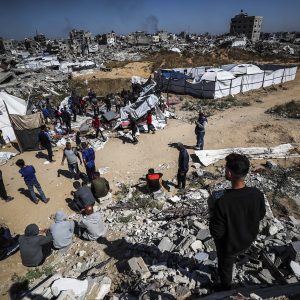Polio vaccination in Gaza hinges on ‘security and access guarantees’: WHO
GENEVA (AA) – The start of a polio vaccination campaign in the Gaza Strip remains uncertain as the World Health Organization (WHO) highlights the need for “security and access guarantees.”
More than 1 million polio vaccines have reached Gaza, but WHO spokesperson Margaret Harris said that the vaccination campaign can only commence once the safety of healthcare workers and access to all parts of the region is ensured.
Harris explained that the re-emergence of polio in Gaza, the first case in 25 years, is primarily due to the collapse of the health system and widespread environmental destruction.
“You’ve got wastewater all over the place. People have a lack of access to any of the basic water and sanitation systems that will normally keep people healthy,” Harris said, emphasizing the deteriorating conditions.
According to her, before the start of the recent conflict, Gaza boasted one of the highest child immunization rates globally, with more than 95% of children vaccinated against polio.
“It still would have stayed out of Gaza if Gaza had stayed a stable system with a strong health system and good water and sanitation,” Harris remarked, lamenting that the conflict has led to the current “terrible state.”
She also highlighted the severe risks posed by polio, particularly to children, who are more likely to suffer from paralysis or even death.
“It can affect anyone, but children tend to have the worst outcomes,” Harris said, stressing the urgency of vaccinating the approximately 640,000 children at risk.
The arrival of the vaccines, facilitated by UNICEF, is a positive step, but the spokesperson noted that the campaign cannot proceed under the current conditions.
“We don’t have the security and the guarantee of access… We’ve been asking for at least pauses in the fighting so that we can do this,” she said.
Harris added that the vaccination campaign, which could be completed in two or three rounds, was initially planned to start at the end of August.
“We cannot do it when there’s fighting, airstrikes, and no roads that can even be traveled safely,” she concluded.











